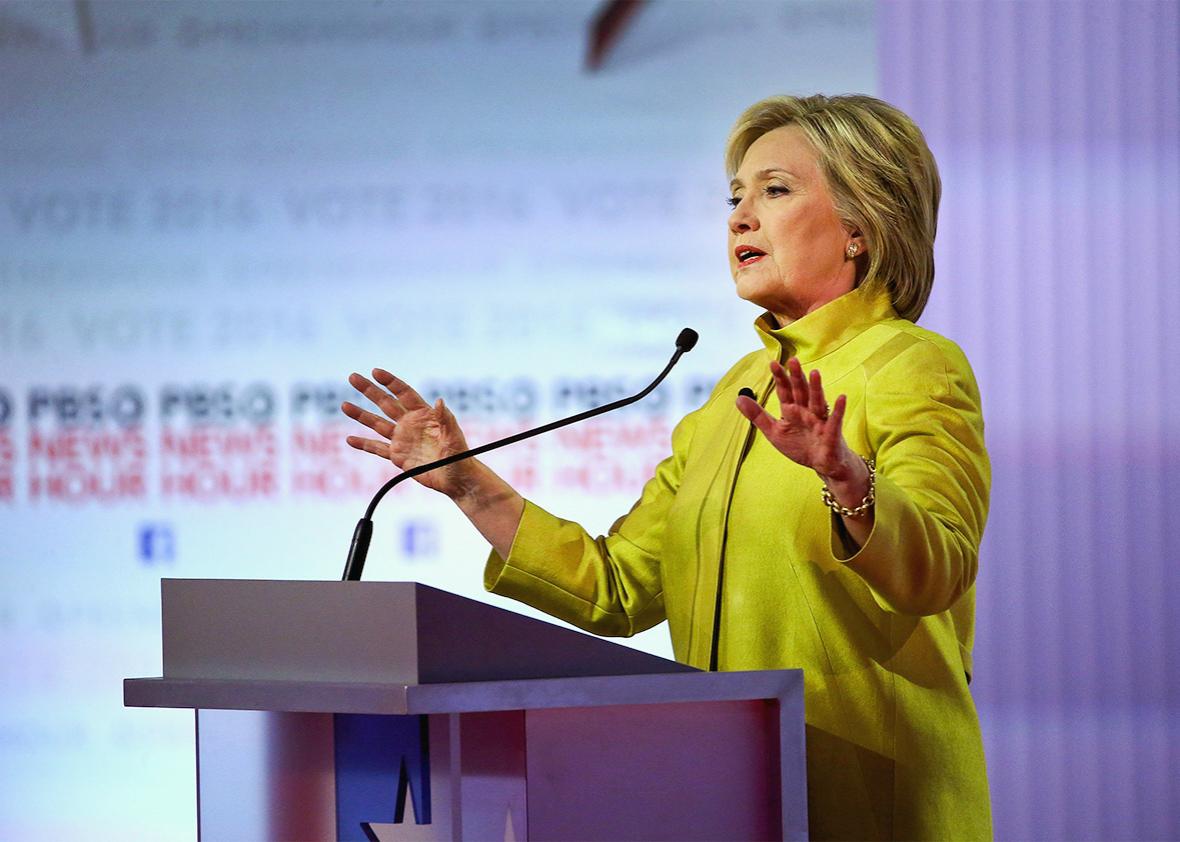Thursday night’s PBS debate co-moderator Judy Woodruff asked Hillary Clinton about large donations made by financial titans like George Soros to her super PAC.* It was a toughly phrased question on what’s become a tough issue for Clinton, for which there aren’t many rousing answers.
“Nearly half of your financial sector donations come from … George Soros and Donald Sussman,” Woodruff asked. “You said there’s no quid pro quo. Is that also true of the donations that wealthy Republicans give to Republican candidates, contributors including the Koch brothers?”
Clinton defended herself first by comparing herself to President Obama, who also took Wall Street donations and whom Sanders nevertheless claims to view favorably. Then she got a bit more creative in attempting to distance herself from the super PAC entirely.
“I can’t speak for the Koch brothers,” she said. “You’re referring to a super PAC that we don’t coordinate with, that was set up to support President Obama, that has now decided they want to support me. They are the ones who should respond to any questions.” A few minutes later she reiterated this Who, me? attitude toward the support from Priorities USA, the super PAC in question: “But the real issue I think the senator is injecting into this is that if you had a super PAC, like President Obama had, which now says it wants to support me, it’s not my PAC, if you take donations from Wall Street you can’t be independent.”
The idea that there was Hillary Clinton just settin’ up the ol’ presidential campaign when along came this super PAC, unbeknownst to her, that decided to collect money on her behalf just for its own sake is risible. Support from Priorities USA, among other super PACs, was very much an effort on behalf of Clinton’s team to get her elected. Clinton has even helped solicit donations for Priorities. From the New York Times in May:
Hillary Rodham Clinton will begin personally courting donors for a “super PAC” supporting her candidacy, the first time a Democratic presidential candidate has fully embraced these independent groups that can accept unlimited checks from big donors and are already playing a major role in the 2016 race.
Her decision is another escalation in what is expected to be the most expensive presidential race in history, and it has the potential to transform the balance of power in presidential campaigning, where Republican outside groups have tended to outspend their Democratic counterparts.
Mrs. Clinton’s allies hope that with her support, the top Democratic super PAC, Priorities USA Action, will raise $200 million to $300 million. That is on par with what the largest Republican organizations, such as the Karl Rove-backed American Crossroads super PAC and its nonprofit affiliate, spent in 2012.
Campaign chairman John Podesta has been personally courting Priorities donations, too. And then there’s Bill Clinton.
Of course, the original idea was that these solicitations would help the Clinton camp raise the money necessary to match Republicans’ outside-cash war chest for the general election. When she was building her presidential campaign, Clinton was not considering the fact that she would run into a difficult primary challenge first, against a candidate who might raise vast sums from an alternate fundraising model and use that contrast against her.
*Correction, Feb. 12, 2016: This post originally stated that Gwen Ifill was the moderator questioning Clinton. It was Ifill’s co-moderator, Judy Woodruff.
